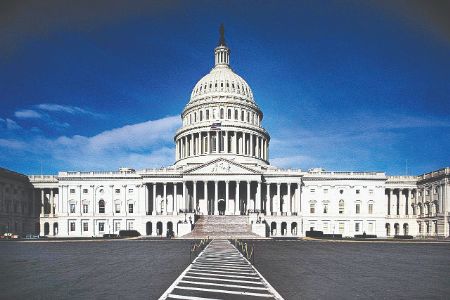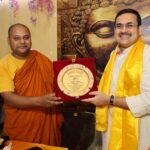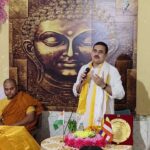The congressional rigmarole
- By : Anirban Ganguly
- Category : Articles

The US congressional hearings on Kashmir are unhelpful and provide divisive figures with a stage to distort narrative vis-à-vis Kashmir post the revision of Article 370
A second Congressional hearing on Kashmir is due on November 14. The participation is of course not uniform, a number of Congressmen with a better and more detailed understanding of the situation in Kashmir and Pakistan’s perfidious nature stayed away the last time such a hearing took place and are expected to stay away this time around as well. It is also being reported that those who are being called upon to give testimony are primarily ‘Indiaphobes’, self-styled networkers and scholars who have been at the forefront in trying to articulate the false narrative of how India under Narendra Modi is degenerating into an “illiberal” democracy!
The hearings, therefore, are hardly impartial and usually reek of partisan politics, biased understanding and deliberate misrepresentation which plays to the galleries because a certain vote-bank or intellectual quarter has to be propitiated or is indulged in simply because of some members wish to boost their political chances and future. In reality the “Kashmir under siege” propaganda is a lucrative business at the international level, right from the days of the Fai collective and even before, a large international pan-continent network has been created around it and thrives to this day.
The likes of the rabid Dibyesh Anand at the University of Westminster in the United Kingdom, Angana Chatterji in the US – Chatterji was dismissed and thrown out of the prestigious California Institute of Integral Studies (CIIS) because of a number of misdeeds – have built up lucrative academic careers by peddling this “Kashmir under siege” narrative. Anand, for example, has been at the forefront of demonising the Indian government on Kashmir. He has frequently called the Indian army an occupational force and has repeatedly organised seminars in the heart of London in which he habitually dishes out unverified, unsubstantiated and patently false propaganda against India. His focus is particularly on Indian policy towards Kashmir and he continuously attempts to perpetuate the radical Islamist agenda.
Chatterji, who was active in the Fai network in the past and was thrown out of the CIIS, has built up a research corpus which spreads hate and misinformation against the RSS, BJP and Modi. The CIIS report indicting her of misdeeds, misuse of position and of working contrary to the ideals of the institute, noted that it was “shocked at the climate of fear and intimidation within the program fostered by Dr Chatterji”. All that Chatterji has spread through her half-baked theories is hatred for Hindu traditions and knowledge systems, hatred for those who speak for these. She has spread fear and hatred through her writings and has promoted societal clash and conflict.
The CIIS was founded by the disciples and admirers of Sri Aurobindo, namely Professor Frederic Spiegelberg of Stanford University and Professor Haridas Chaudhuri, who had been specially asked by the Sage to proceed from India to the West in order to spread the message of the Integral yoga and philosophy. Academic par excellence, Chaudhuri and his wife painstakingly built up the Institute. Professor Speigelberg, a legendary teacher of Asian religions, was one of the foremost pillars of this effort besides being a very able interpreter of Sri Aurobindo to the West. It was such an august institution that Chatterji sought to destroy through a vicious academic programme that churned out anti-India and anti-Hindu propaganda which was an antithesis to all that Sri Aurobindo espoused or stood for. She assimilates within herself the violence of radical Islam, the viciousness of the urban Naxal and the hate of the liberal fundamentalist. It is elements such as these which have been most unnerved with the abrogation of Article 370, with the new narrative in Kashmir and overall with the fact that Modi is unstoppable in his quest for a new India.
But such Congressional hearings aimed at India are not the first of its kind, they have happened in the past and even then these had very little impact on the ground. Today with an Indian government which is in control of the situation, which is clear and determined about protecting and perpetuating India’s security imperatives and which has stood its ground and has countered terror and nuclear blackmail, these hearings have even lesser import and impact. In the long run, in course of India’s steady democratic march, such public show of disapproval and castigation will leave no effect. It is Modi’s commitment to his people and responsiveness to his mandate that has made the difference. This has seen him return to power through a highly credible, tested and a globally recognised democratic exercise.
What really bothers these elements on the Congressional hearing circuits and those who keep doing the rounds of international conferences is the fact that ever since the abrogation of article 370, Kashmir did not see any clash and did not witness the oft peddled Indian security forces going berserk scenario. These same people waited for India to erupt after the Ayodhya verdict, they waited so that their “India slipping into an illiberal democracy” narrative could be corroborated. But just as India did not erupt after the removal of 370, India did not flare up after the Ayodhya verdict either. This was the sign of true liberalism, of the advent of the real liberal India under Modi and not a pseudo-liberal republic championed by the liberal and Marxist fundamentalists.
Interestingly, these hearings and their participants never speak of the actual human rights record of Pakistan, its atrocious record in the portion of Kashmir that it has illegally occupied and in Balochistan. These hearings and their leaders have never displayed the gumption to take on as rogue a state as Pakistan on its abominable human rights record. In his well researched and argued book recently published, “Pakistan – the Balochistan Conundrum”, Tilak Devasher, for instance, documents the appalling atrocities that Pakistan continues to commit on the people of the region. He has written, how, “during the last decade, the most ominous development [in Balochistan] has been the sickening frequency with which the people have gone missing and how their bodies have started turning up after some time.” This is proof, Devasher argues, “that the constitutional right to life and freedom from arbitrary detention are violated with impunity.” In the words of journalists in the region, “Not being dead is a victory in today’s Balochistan if you are a journalist. Worse, there is little or no hope of prosecuting the killers, let alone sentencing them. Most deaths of journalists go unpunished as a norm. This is the price our media has to pay for keeping the torch alive.”
Pakistan’s exploitation and oppression in the portion of Kashmir that it has illegally occupied also continues unabated. One hardly hears of the plight of these people in the international human rights circuit, the exception being this time around when a global furore erupted around the time of the UN General Assembly over Pakistan’s record in these regions. The only way to true liberation from oppression for the people of PoJK is when that occupied portion returns to India.
For every right-thinking Indian, thus, the demand for the recovery of India’s territory in Kashmir occupied by Pakistan and illegally ceded to another power is sacrosanct. It continues to hold true and keeps striking a chord. It is a sense, an aspiration, a determination that has to be kept alive in every nationalist heart. The words of Deendayal Upadhyaya still ring when at a huge public rally in Raipur sometime in 1957, he had demanded that the government of India must also act “to free the so-called Azad Kashmir.” That portion of Kashmir, he said, “is also a part of India”.
The rigmarole of Congressional hearings is one-sided, biased and unhelpful. Meanwhile, the destiny of India is unfolding, her unity is being worked out and nearing fruition, that which was once lost will also return to her fold.

















